|
|
|
Sort Order |
|
|
|
Items / Page
|
|
|
|
|
|
|
| Srl | Item |
| 1 |
ID:
124888
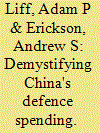

|
|
|
|
|
| Publication |
2013.
|
| Summary/Abstract |
China's limited transparency concerning its defence spending harms strategic trust, but foreign analysts often lose sight of important realities. Specific details remain unclear, but China's defence spending overall is no mystery - it supports PLA modernization and personnel development as well as its announced objectives of securing China's homeland and asserting control over contested territorial and maritime claims, with a focus on the Near Seas (the Yellow, East, and South China seas). This article offers greater context and perspective for Chinese and Western discussions of China's rise and concomitant military build-up through a nuanced and comprehensive assessment of its defence spending and military transparency.
|
|
|
|
|
|
|
|
|
|
|
|
|
|
|
|
| 2 |
ID:
129494


|
|
|
|
|
| Publication |
2014.
|
| Summary/Abstract |
This study revisits the causal linkages between military spending and economic growth in China and G7 countries (i.e. Canada, France, Germany, Italy, Japan, the UK, and the USA) by focusing country-specific analysis for the period 1988-2010. The panel causality analysis, which accounts for both cross-country dependency and heterogeneity across countries, is employed in this study. Our results find evidence of the neutrality hypothesis for Italy, France, and Germany, the military spending-growth detriment hypothesis for both Canada and the UK, and one-way Granger causality running from economic growth to military spending for China. Furthermore, we find a feedback between military spending and economic growth in both Japan and the USA. Thus, our results do not support that one size fits all.
|
|
|
|
|
|
|
|
|
|
|
|
|
|
|
|
| 3 |
ID:
137416


|
|
|
|
|
| Summary/Abstract |
The financing of Common Security and Defence Policy (CSDP) operations questions the capacity of the European Union (EU) to contribute to crisis management. Instead of a single mechanism that would be used for all kinds of missions, different mechanisms are applied, depending on the objective and nature of the operation. The aim of this article is to explain change and inertia in the way these operations are funded. The first section is dedicated to the presentation of the legal framework and its characterization as a fragmented and flexible structure. It allows for identifying the changes that have affected the financing of EU operational activities abroad. The main problems and challenges in financing CSDP operations are dealt with in the second section. The third section explains: (1) why changes have occurred in some areas and (2) why inertia has prevailed in other areas in spite of the problems previously identified. Three main explanations are tested. Rules and practices in financing CSDP operations (1) result from operational needs, (2) are influenced by proactive supranational institutions and (3) are triggered by the Member States. These three explanations are not mutually exclusive. They all contribute to the understanding of CSDP operations, but the relative importance of each factor depends on the operations at hand. Generally, the second factor is at play in the case of civilian operations, while the third one prevails with regard to military operations. The first factor brings a complementary explanation to both kinds of operations.
|
|
|
|
|
|
|
|
|
|
|
|
|
|
|
|
| 4 |
ID:
143458
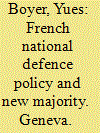

|
|
|
|
|
| Publication |
Geneva, Programme for Strategic and International Security Studies, 1981.
|
| Description |
65p.pbk
|
| Series |
PSIS Occasional Paper; no. 4 E
|
|
|
|
|
|
|
|
|
|
|
|
Copies: C:1/I:0,R:0,Q:0
Circulation
| Accession# | Call# | Current Location | Status | Policy | Location |
| 020976 | 355.944/BOY 020976 | Main | On Shelf | General | |
|
|
|
|
| 5 |
ID:
126291


|
|
|
| 6 |
ID:
109988
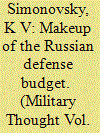

|
|
|
|
|
| Publication |
2011.
|
| Summary/Abstract |
The author gives a schematized structure of government military expenditure; offers his own definition of the defense budget concept, and looks at the sources from which the budget is funded and at its role in providing the economic guarantee of the country's military security.
|
|
|
|
|
|
|
|
|
|
|
|
|
|
|
|
| 7 |
ID:
002509


|
|
|
|
|
| Publication |
Washington, Committee for National Security, 1984.
|
| Description |
iii, 35p.
|
|
|
|
|
|
|
|
|
|
|
|
Copies: C:1/I:0,R:0,Q:0
Circulation
| Accession# | Call# | Current Location | Status | Policy | Location |
| 033930 | 355.622/MIL 033930 | Main | On Shelf | General | |
|
|
|
|
| 8 |
ID:
104649
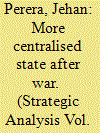

|
|
|
| 9 |
ID:
184053


|
|
|
|
|
| Summary/Abstract |
Net profits of state-run chance games are either earmarked for non-defence ‘good causes’ or added to the public purse in international practice. The Turkish case is unique as 95% of profits were earmarked for the extrabudgetary Defence Industry Support Fund (DISF) by legislation during 1986–2007. The DISF administers security equipment procurement and domestic arms production in Turkey. The earmarking practice was dissolved in 2007 and chance game profits are transferred to the general budget. The incomings of the DISF are from the budget and from earmarked taxes from 2007 onwards. The purpose of this paper is to investigate the effect of these practices on chance game sales for the period 1986–2017. Noting that a chance game is a joint public-private good, participation is motivated by expectations for private gain but at the same time loss is legitimised by expectations for provision of public services with the takeout part. In order to gain insight into the societal motives in chance game participation in Turkey our model is defined in the context of private (consumerism) cum public (security, warfare) interest. The VECM estimates support a long-run relationship between chance game sales and security variables.
|
|
|
|
|
|
|
|
|
|
|
|
|
|
|
|
| 10 |
ID:
128850
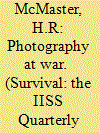

|
|
|
|
|
| Publication |
2014.
|
| Summary/Abstract |
A thematic selection and analysis of war photography across 165 years has tremendous explanatory power about the nature of modern war and the human experience in war and its aftermath. The year 2014 brings centennial commemorations of events that helped make the twentieth century the bloodiest in human history. Among these are the assassination of Archduke Franz Ferdinand on 28 June, Germany's invasion of Belgium and France on 4 August, and the First Battle of the Marne in early September - the battle that halted the German offensive and ushered in an unprecedented period of stalemated, destructive warfare on the Western Front. As historian Margaret MacMillan has observed, the First World War still haunts us not only because of the scale of the carnage and suffering, but because so many believed that the early-1900s version of globalisation and interdependence had rendered war futile. The comparisons to today seem obvious, as the United States and European nations cut military budgets based, in part, on the belief that large-scale armed conflicts are relics from a barbarous past. If, however, peace remains as the Ancient Greek historian Thucydides described it over 2,500 years ago - 'an armistice in a war that is continuously going on' - understanding war and warfare will remain important for preventing conflict, as well as for its effective conduct. Understanding war's human, psychological and social dimensions requires an interdisciplinary approach and study across multiple genres including literature, art, film and photography.
|
|
|
|
|
|
|
|
|
|
|
|
|
|
|
|
| 11 |
ID:
103155
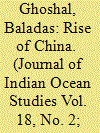

|
|
|
| 12 |
ID:
151333


|
|
|
|
|
| Summary/Abstract |
In recent years, China has started throwing its weight around. It has defied international law and risked violent clashes in the East China and South China Seas [2]. It has bent trade rules by discriminating against foreign businesses to help its own. It has tried to shut out foreign influences while promoting its own propaganda abroad. And it has resisted [3] Western demands that it put more pressure on its ally North [4]Korea [4]. China’s new assertiveness stems, in part, from its growing power; the country now boasts the world’s second-largest economy and its second-largest military budget. But domestic insecurities have also played a role.
|
|
|
|
|
|
|
|
|
|
|
|
|
|
|
|
|
|
|
|
|